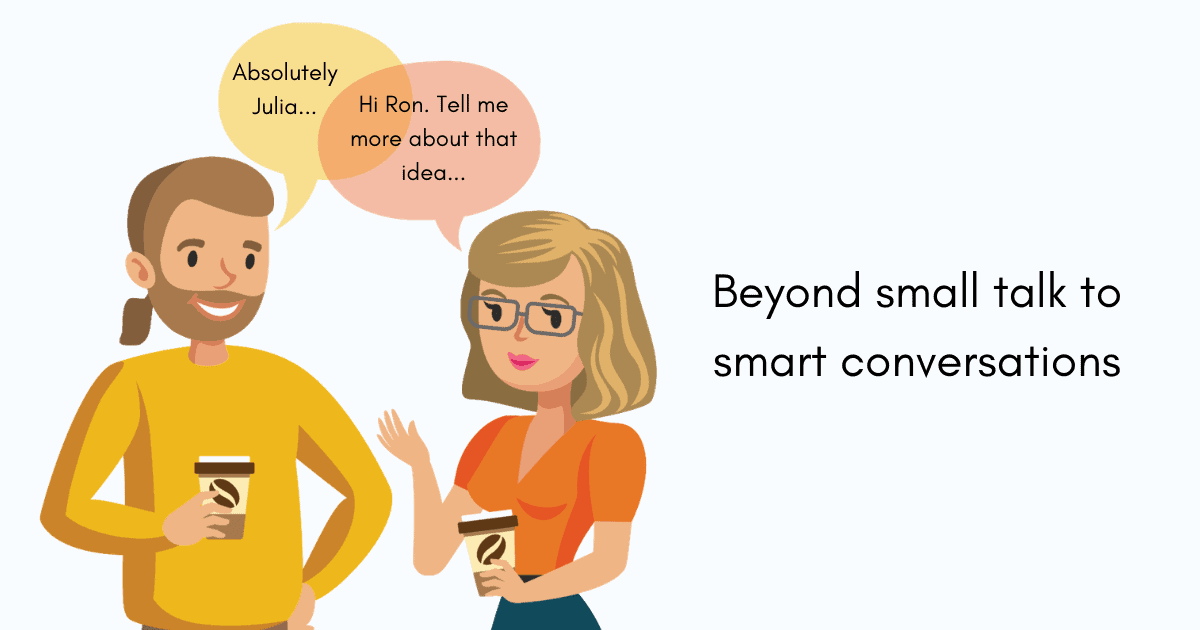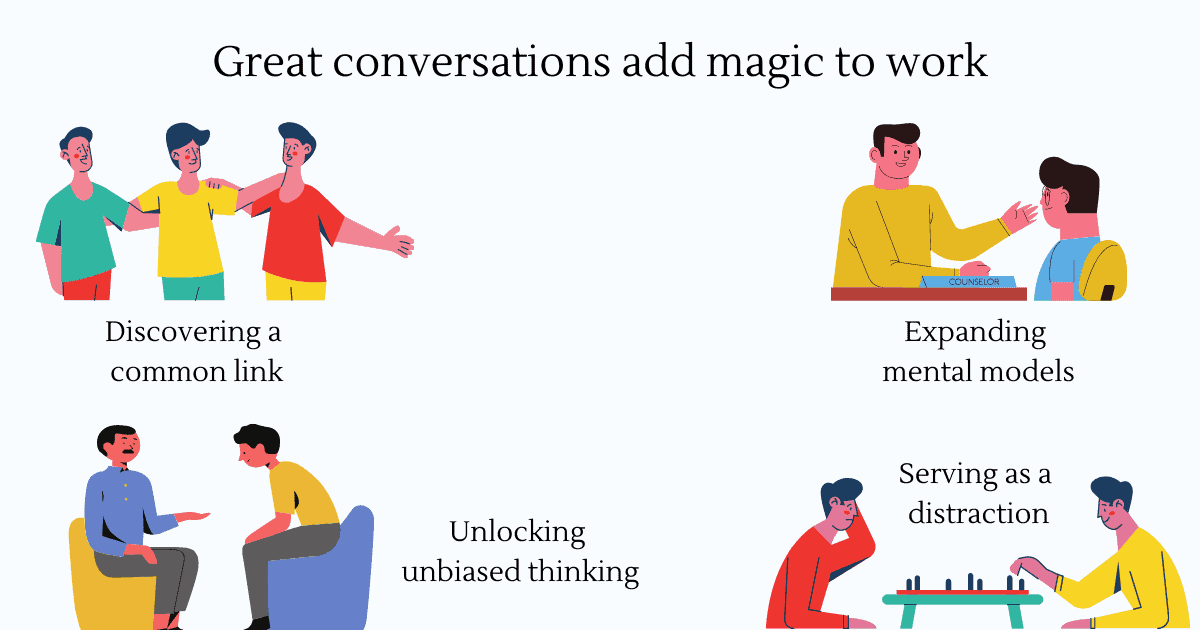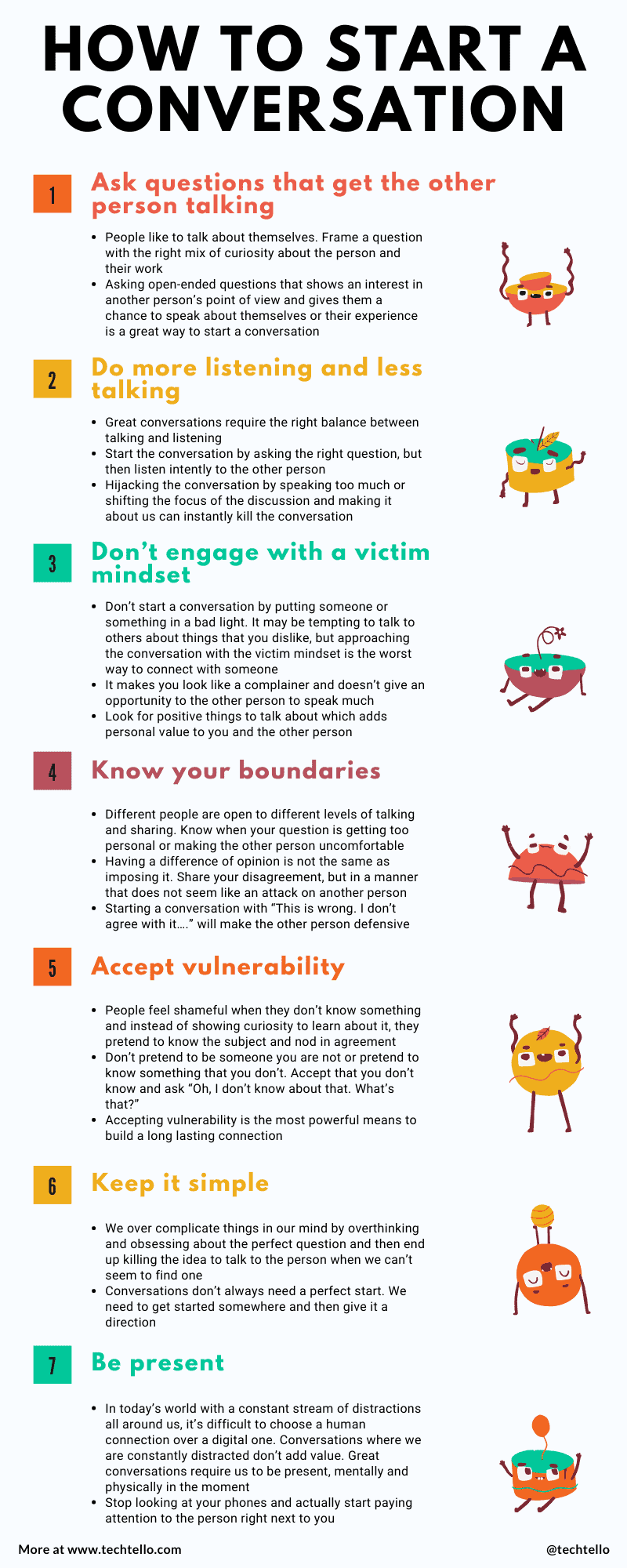How To Start A Conversation: Get Beyond Small Talk To Forming Meaningful Connections At Work

Striking up a conversation at work can be intimidating. We avoid eye contact, turn our heads away and pretend to be busy on our phones all in an attempt to save ourselves from the awkward moment of meeting someone and not sure what to say.
And if we do gather up a little courage to look them in the eye, the conversation starter “hey, what’s up, how is it going, how are you” instantly kills the conversation. Everyone knows these words are an attempt to be polite without the intention to engage.
There are plenty of opportunities at work to bond with the coworkers. How about a few moments before the meeting gets started, lunch hours, coffee breaks or those other water cooler chats.
You can use small talk to fill in those moments of silence, but it’s only the deep desire to understand the other person that can form meaningful connections at work – what’s valuable to them, what interests them about work, how they solve problems, what they struggle with and what comes easy to them.
Celeste Headlee writes in We Need to Talk “It seems like we rarely converse anymore. I mean, we talk and we chat (often over text or e-mail), but we don’t really hash things out. We spend a lot of time avoiding uncomfortable conversations and not enough time making an effort to understand the people who live and work around us.”
Yes, it does take effort and energy to start a conversation, be curious about others, pay attention to them and try to form a connection. Nothing that’s easy adds much value to our lives.
Before we talk about what to talk about at work, know how these conversations add significant value to our work lives and why they are worth our time.
How great conversations add magic to work

Workplace conversations can work like a charm. There are interesting people all around us who can inspire, rejuvenate, unblock our thinking and add that extra meaning to our work life.
Discovering a common link
Starting a conversation with a coworker knowing nothing about them to finding a shared interest can instantly energise you – how you both contribute to the open-source community, love for solving problems, interest in designing systems, passion for writing code and so on.
It’s the same feeling as finding a person from your home town in a foreign land. You instantly click and connect, grabbing onto that weak link and may end up bonding with the person as you commit more time and energy to the relationship.
The newfound connection adds positivity to your work life and can help you share ideas and learn from each other in work that matters to you.
Expanding mental models
Speaking to a co-worker from another cross-functional unit may give you an idea to a problem that you have been stuck with for so long. As David Epstein writes in Range “Big innovation most often happens when an outsider who may be far away from the surface of the problem reframes the problem in a way that unlocks the solution”
Speaking to people with diverse backgrounds and domain knowledge can also help you draw ideas from these domains, expand your thinking beyond your circle of competence and help you build new mental models to solve problems and make better decisions.
It enables the mindset shift from being stuck as a specialist to appreciating the value in being a generalist.
Serving as a distraction
A meaningful conversation with a co-worker can give you the much needed break after deep focussed work to re-energize and refuel your mind for doing more quality work.
Being purposeful about these conversations in moments when you need them can serve as a good distraction and help you be more productive.
They can also be a source of creative outflow by helping you shift from obsessing about the problem to giving space to your brain to form new connections.
Harvard University researcher and psychologist Shelley H. Carson says “Distraction isn’t always a bad thing. If you are stuck on a problem, an interruption can force an incubation period. In other words, a distraction may provide the break you need to disengage from a fixation on the ineffective solution”
Unlocking unbiased thinking
How you view people at work can change only if you take the time to look beyond your biases and make an attempt to understand them.
Your attribution bias may be at play when you are quick to attribute someone’s behaviour at work to their character flaw without taking their situational factors into account.
By engaging with co-workers and colleagues with an intent to understand, you will be able to rationalise why people behave in certain ways and devise better strategies for collaboration instead of resorting to fight or flight response. A difficult person may turn out to be extremely collaborative when given an opportunity to explain.
Celeste Headlee writes in We Need to Talk “It only takes one good conversation to change your understanding of someone else’s world, your world, and the world at large.”
Great conversations add magic to work. They bring you in touch with other like minded individuals, expand your thinking, improve your productivity and make you a better person by shifting from passing snap judgments to adopting an attitude of understanding.
And who knows, you may just come across someone who helps you kick off your dream startup, become a friend for life or maybe even a life partner.
7 ways to start a conversation and build meaningful connections at work
These 7 ways will guide you on how to have effective conversations at work that does not involve small talk and adds value to work without making you feel uncomfortable.
1. Ask questions that get the other person talking
People like to talk about themselves. A question framed with the right mix of curiosity about the person and their work can be a great way to start a conversation.
Stephen R. Covey in The 7 Habits Of Highly Effective People
Next to physical survival, the greatest need of a human being is psychological survival—to be understood, to be affirmed, to be validated, to be appreciated. When you listen with empathy to another person, you give that person psychological air. And after that vital need is met, you can then focus on influencing or problem solving
While waiting for a meeting to get started, you notice Jon who works in the analytics department. This is a great opportunity for you to connect with a person from another unit by asking “Hi Jon. I am […] from […]. I will be working with your team to integrate our product with the new analytics system. Being the chief architect of the new system, you might be the perfect person to share the key highlights of your product. I am curious to know what went into designing it”
A new product manager Keith joins your team. Make that first impression count by asking “Hi Keith. I am […]. I work on […]. What excites you about product management?”
Your boss’s boss Julia is in the elevator. Don’t miss the chance to connect by saying “Hi Julia. I am […] from […]. We are working on this new product […] that I am excited about. You shared some great insights about our last product. Curious to know what you think about this one.”
Asking open-ended questions that shows an interest in another person’s point of view and gives them a chance to speak about themselves or their experience is a great way to start a conversation.
2. Do more listening and less talking
Epictetus, a great Greek Stoic philosopher said, “We have two ears and one mouth so that we can listen twice as much as we speak.”
Great conversations require the right balance between talking and listening. Active listening, though difficult, is the most effective medium to communicate and form a connection that inspires the other person to open up and share what they really think and feel.
Dale Carnegie writes in How to Win Friends and Influence People
If you aspire to be a good conversationalist, be an attentive listener. To be interesting, be interested. Ask questions that other persons will enjoy answering. Encourage them to talk about themselves and their accomplishments
Start the conversation by asking the right question, but then listen intently to the other person with the desire to learn more about them. People can see when we are genuinely curious and when we are faking it.
Hijacking the conversation by speaking too much or shifting the focus of the discussion and making it about us can instantly kill the conversation.
3. Don’t engage with a victim mindset
Don’t start a conversation by putting someone or something in a bad light – our boss sucks, this is a crap presentation, this meeting is a waste of time and so on.
It may be tempting to talk to others about things that you dislike or not going so well for you with the assumption that they feel the same way, but approaching the conversation with the victim mindset is the worst way to connect with someone.
It makes you look like a complainer and doesn’t give an opportunity to the other person to speak much.
Talking to people with a negative frame of mind can turn them off and avoid you in future interactions.
Take this advice from Olivia Fox, The Charisma Myth “Aim to keep your questions focused on positive subjects because people will associate you with whatever feelings your conversation generates. Focus on questions that will likely elicit positive emotions. With your questions, you have the power to lead the conversation in the direction you want”
Look for positive things to talk about which adds personal value to you and the other person.
4. Know your boundaries
Different people are open to different levels of talking and sharing. Know when your question is getting too personal or making the other person uncomfortable.
Also, having a difference of opinion is not the same as imposing it. Share your disagreement, but in a manner that does not seem like an attack on another person.
Starting a conversation with “This is wrong. I don’t agree with it….” will make the other person defensive.
However, if you start with the curiosity to understand them first by asking “Tell me more why you think this way…”, they will be more open to your disagreement when you share it later by saying “My opinion is […]. What do you think about it?”
5. Accept vulnerability
Brene Brown talks about excruciating vulnerability. She says “It’s the idea that for connections to happen, we need to allow ourselves to be seen, really seen.”
People feel shameful when they don’t know something and instead of showing curiosity to learn about it, they pretend to know the subject and nod in agreement. Such superficial conversations are pointless and do not lead to building trust and connection.
Don’t pretend to be someone you are not or pretend to know something that you don’t. Accept that you don’t know and ask “Oh, I don’t know about that. What’s that?”
Accepting vulnerability is the most powerful means to start a conversation and build a long lasting connection.
Start a conversation by asking “I don’t know much about […]. Can I pick your brain to learn more about it?”
6. Keep it simple
We over complicate things in our mind by overthinking and obsessing about the perfect question and then end up killing the idea to talk to the person when we can’t seem to find one.
Conversations don’t always need a perfect start. We need to get started somewhere and then give it a direction.
When nothing else comes to mind, asking simple questions like these can get the conversation flowing:
- What’s interesting about your work
- What keeps you busy
- What are you learning these days
- Who has the biggest influence in your life
- What practices do you follow for continuous improvement
- What new skills are you focusing on
- What’s your advice on […]
- I am curious about […]. What resources do you recommend on this topic
7. Be present
In today’s world with a constant stream of distractions all around us, it’s difficult to choose a human connection over a digital one. But, conversations where we are constantly distracted don’t add value. Great conversations require us to be present, mentally and physically in the moment.
Celeste Headlee says “We got all that terrible advice we got to look someone in the eye and nod your head and say ‘uh huh, ’ is just teaching you how to pretend you are paying attention—and that’s totally unnecessary if you are paying attention!”
And Olivia Fox talks about being fully present in The Charisma Myth “The ability to be fully present makes you stand out from the crowd; it makes you memorable. When you’re fully present, even a five-minute conversation can create a “wow” effect, as well as an emotional connection”
Stop looking at your phones and actually start paying attention to the person right next to you. Start a conversation by committing to being present instead of giving in to distractions.
Work life can be more meaningful if we can learn to connect with all the interesting people in it. Conversations that go beyond small talk to the desire to understand and learn from each other can be a powerful source of energy.
Do you engage in small talk or make an attempt to start a conversation by showing an interest in another person? Write to me or share your thoughts in the comments below.


































Your blog is really inspiring, also the examples are really helpful.